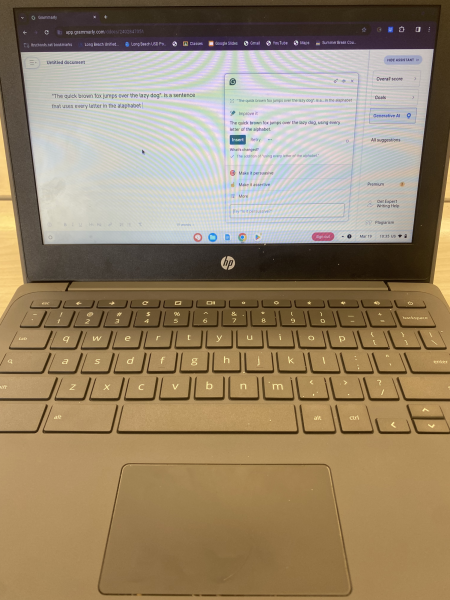
From personalized learning to AI editing systems, AI is playing a crucial role in shaping the future of education.
Mike Prado, the Millikan 11th grade COMPASS English teacher, has started to use Class Companion as a way for students to get feedback on their work in less than a minute. “Teachers are always looking for new tools, and [Class Companion] is extremely useful,” says Prado.
AI, or Artificial Intelligence, is a simulation of human intelligence usually through computer systems. Grammarly, Turnitin, and Lensa are just a few examples of AI websites that are becoming increasingly popular. Because of the rapid developments, AI websites have become more accessible and with just a quick search, you can find dozens of different AI online websites.
AI, if used correctly, can help improve your writing or even help you learn something new. Especially because of the more recent popularity, if you ever need suggestions on your writing or help in school you can either ask a teacher or, go to your favorite AI for help. Because of the recent growth of AI, apps like Instagram and Snapchat have started to implement AI into their software, to help you with prompts, ask it funny questions, or simply have a conversation with it.
Another website that has started to implement AI is Khan Academy, although, to use the AI you do have to pay $4 monthly or $44 yearly. Their AI is called Khanmigo, and you can use it as a one-on-one tutoring experience that will promote critical thinking and suggest resources to help you. The AI helps tutor you in anything that Khan Academy would teach you but, Khanmingo allows you to learn at your own pace while also giving you outside resources to help. Khanmingo is just one example of AI being implemented into education.
Turnitin is another instance of AI in schools, it checks the work you have turned in for both plagiarism and self-plagiarism. Self-plagiarism is defined as reusing your own specific wording and ideas from work that you have turned in, in the past. Turnitin uses a massive database of written work, including your previous submissions, to check your work. Once Turnitin checks your work, it gives you a similarity score and it’ll highlight the text that is similar in the color that matches the score you received. Blue means there is no similarity, green is one word to 24%, yellow is 25-49%, orange is 50-74%, and red is 75-100%, a score between 0-20% is generally accepted with no issues. Turnitin is mainly used by teachers through Canvas, which is how they check the submissions of their students. But, as students you can add an extension to Google Docs called Turnitin Draft Coach. Similarly to Grammarly, the extensions checks for grammar, checks for correct citation and plagiarism before you turn it in.
Grammarly is an additional example of AI that could help you in school. Grammarly uses its systems to analyze your work, giving you suggestions on how to improve your writing through punctuation, spelling, grammar, and tone detection.
Whether you need help analyzing your written work or help in school, AI’s are starting to be the “one stop shop” for all things you may need help with. Don’t be afraid to look into these AI’s as they are becoming a more useful tool to quickly give feedback and enhance your writing and knowledge.










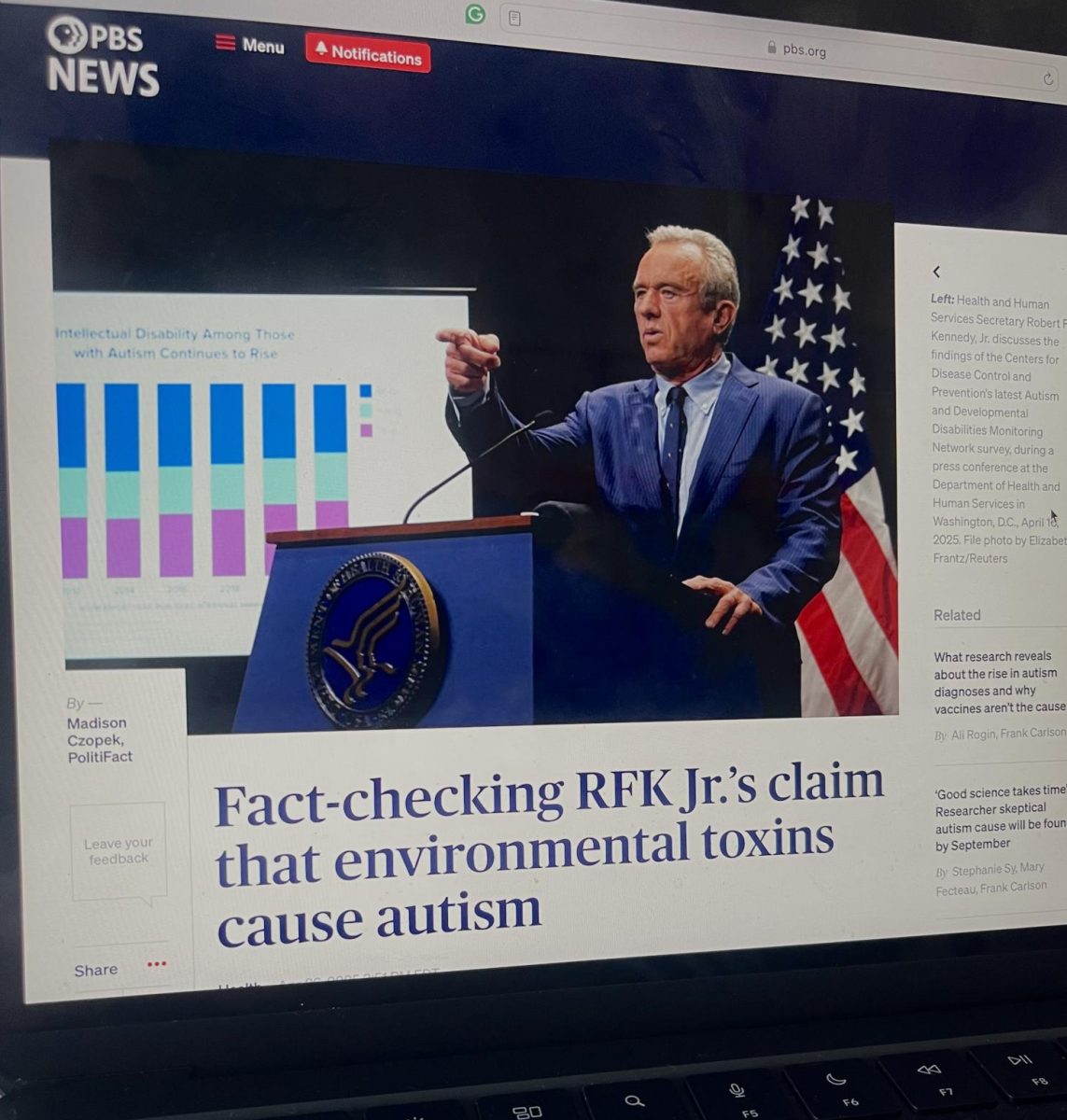



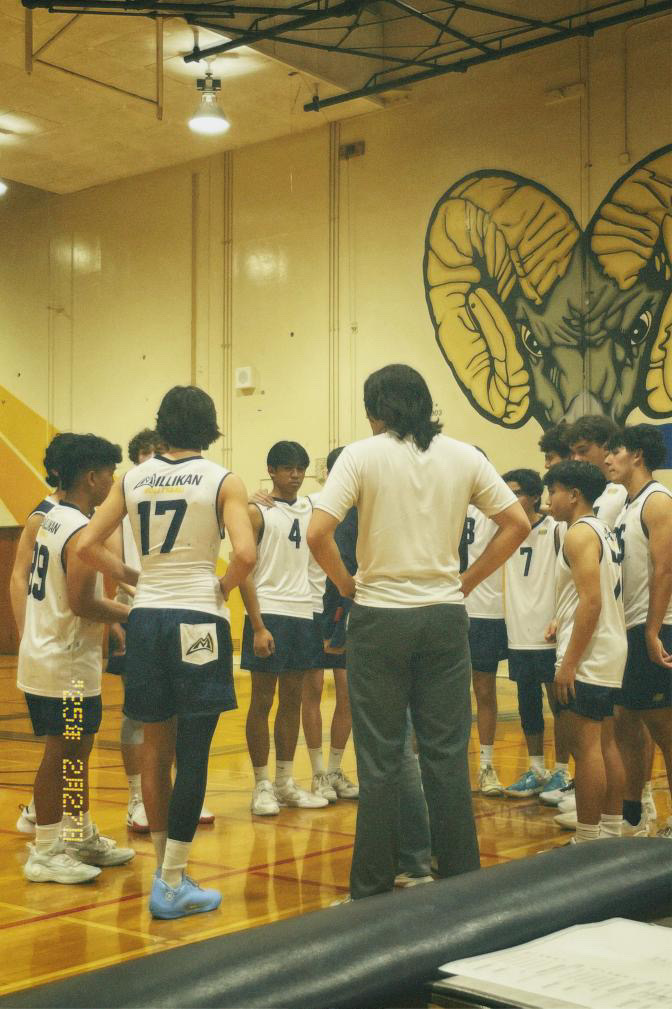



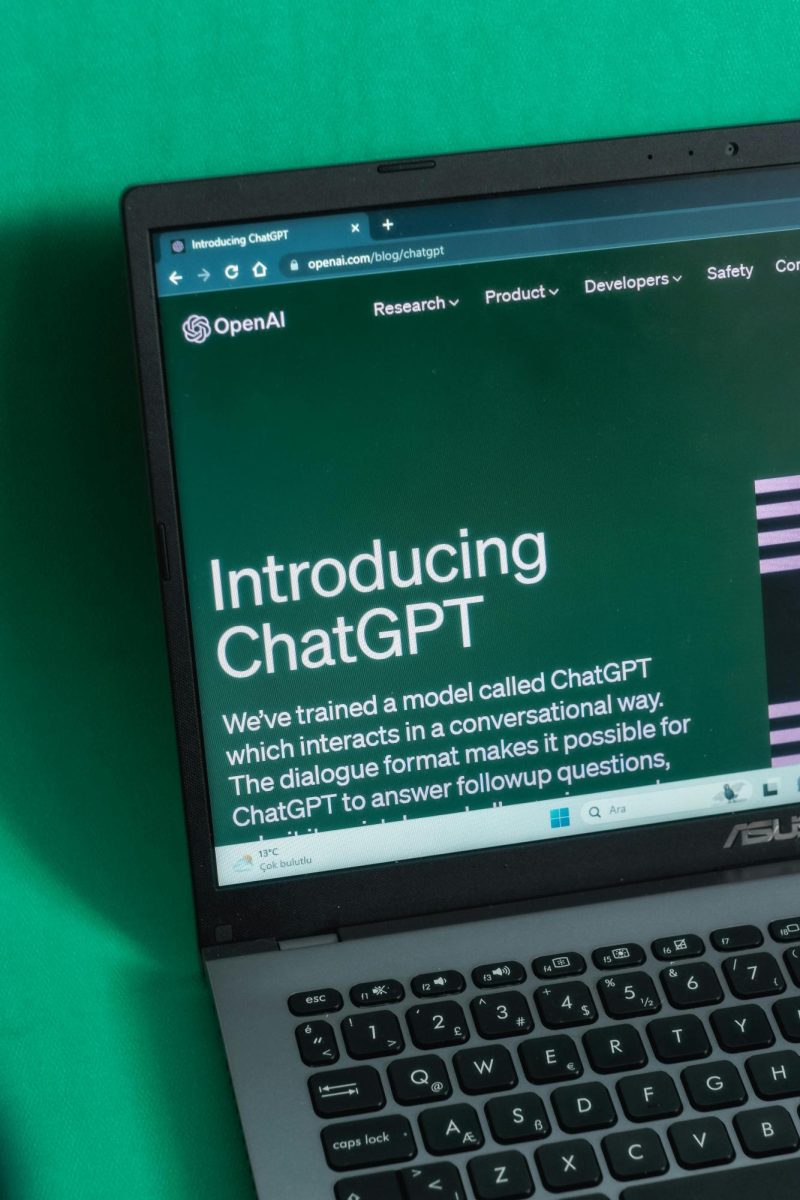





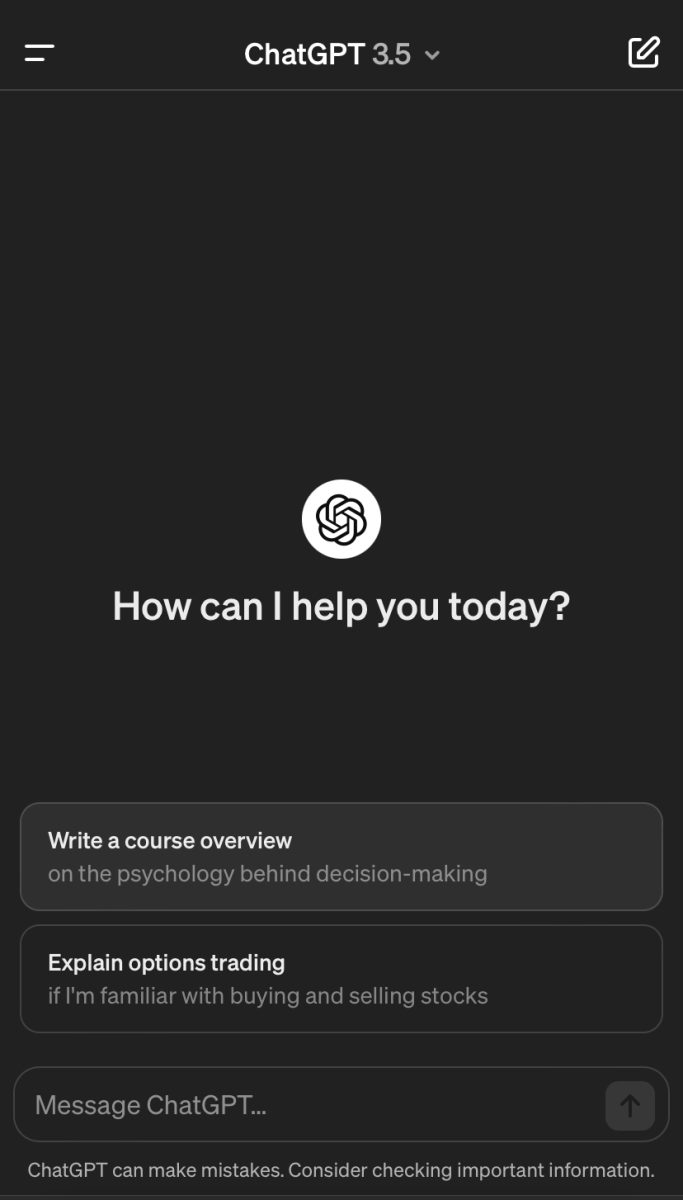

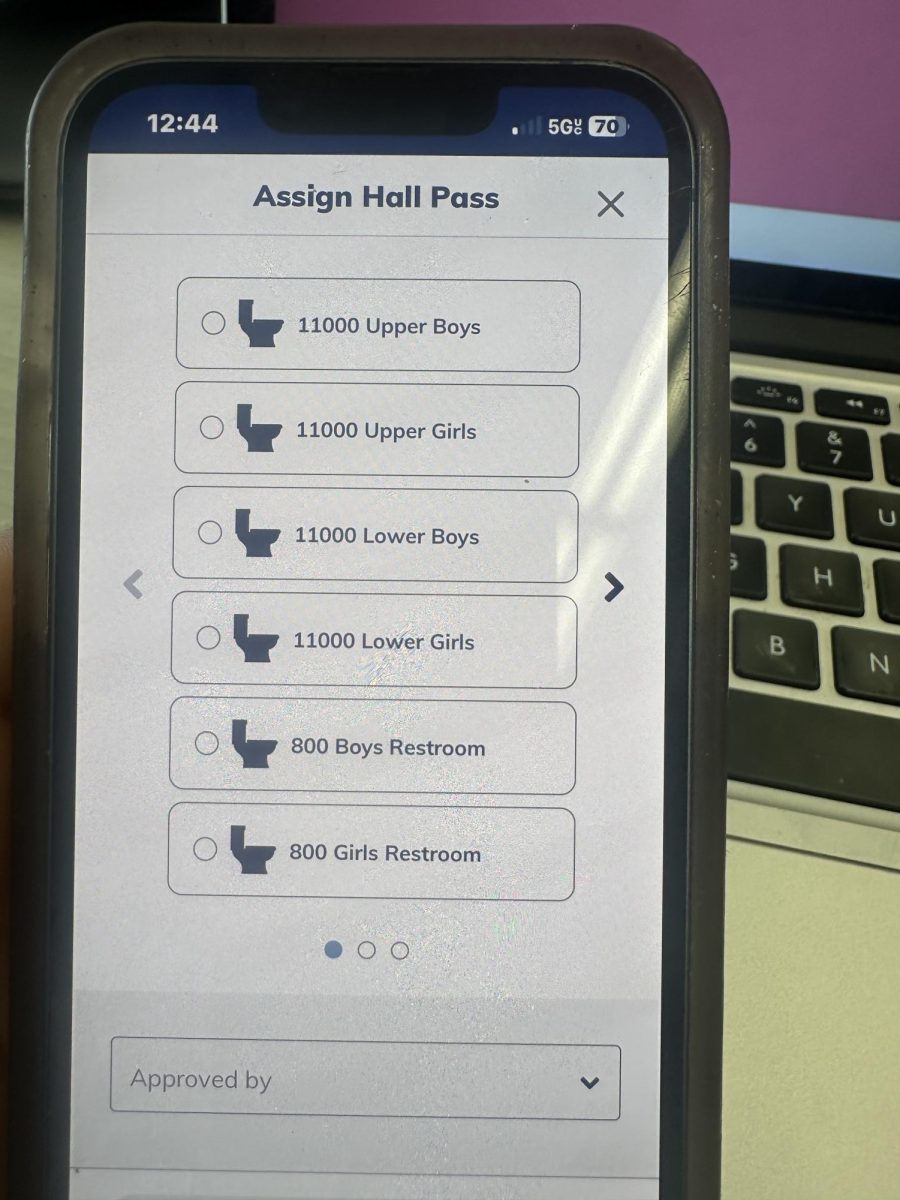






Zain • Apr 11, 2024 at 1:36 pm
On April 8, 2024, Jocelyn Owen wrote an article titled “AI in Education”. I agree with the author because there are many instances where AI is a useful tool that can be used to proofread, help with critical thinking, and plagarism detection. I like the way that she states all these different websites and programs that use AI in their own unique way. I think to make this article stronger she should talk about the negative side of AI in the school setting. The school has banned Chat GPT due to copy and pasting directly from the website. Not only is that academic dishonesty but it’s also complete plagiarism. I feel like if students have access to this and are allowed to turn in their essays like that it will just make them more lazy and have AI write their essays instead of writing and thinking themselves. Overall I think this is a good article, as it introduces an upcoming topic that will have a big effect on education in the future.
Orlando Mayorga • Apr 11, 2024 at 1:31 pm
The article does a great job of explaining the effect that AI is having in schools for both students and teachers. AI is having a great impact on the classroom as it provides teachers with a great way to check work more efficiently for quality as well as plagiarism. Likewise, students are finding more and more ways in which they can use AI to benefit themselves in their learning endeavors. Although the arguments really explain AI, I feel like a counterargument could have been implemented to show how it is negatively affecting the education of students. AI is becoming so advanced to the point that it can begin completing your work for you. Although there are programs that can detect an AI written response, AI is advancing and improving every week. I know that students are taking advantage of this new software technology and therefore negatively affecting their own learning. There are ways that we can use AI without asking it for complete projects such as by clarifying topics or to teach you how to do certain things. Owen does a great job of highlighting the ways in which this new technology is altering the lives of education and schools.
Anna Amaya • Apr 11, 2024 at 11:03 am
This article does an excellent job of presenting how artificial intelligence is changing the way we learn as students in a daily classroom. Changes in how information is absorbed and distributed amongst students can affect both the teachers and students in various different ways as described in the article. The inclusion of different AI programs that are most commonly used gives us as students some resources we can use in the future when we need help from artificial intelligence in our academic work.
Although the article does include quotes from a teacher on campus that is using AI in their classroom, it would be more informative to add another teacher using a different software and how that has affected their teaching and how well their students learn from it. The article could also use quotes from students using AI to improve academic work and how it affects them in how they complete work for various subjects. Overall, the article does inform students about a developing change happening to our education and how that affects everyone in the classroom.
Zoe Huynh • Apr 11, 2024 at 10:59 am
This article wrote about the use of AI in education and how they are being used as tools. It listed a couple examples of AI that classes and teachers are starting to use. Turnitin, Class Companion, Grammarly and more are utilized in the classroom. Turnitin helps to check for plagiarism and self-plagiarism. Class Companion helps to give feedback on students’ work, so students can learn how to improve their work. The article also mentioned how Khan Academy started to introduce its own AI called Khanmigo. There was also a quote from Mr. Prado says that teachers are always looking for tools to help out and how there are tools that are very useful. I think that using AI to help education is acceptable as long as it is used correctly and responsibly. I liked how this article helps to show the positive side of using AI rather than looking upon it negatively.
Darren Tran • Apr 11, 2024 at 10:34 am
This article does a phenomenal job at conveying the importance of AI technology in education. Students can greatly benefit from the use of AI in education for their own improvement. Additionally, teachers can also use AI in order to check for plagiarism effectively and quickly. However, this article could benefit from demonstrating the downsides of AI in education. For instance, many people are using AI to write their own work for them. It is important to note that AI can have both positive and negative impacts within education and it is crucial to acknowledge both. Furthermore, the possibility of AI being able to replace teachers is an interesting topic that should have been delved into. AI has the ability to accomplish great things for education but it is important to note the negative effects that come with it. Overall, this article was great for explaining how AI could be useful in education for both students and teachers.
Brandon Janney • Apr 11, 2024 at 9:48 am
On April 8, 2024, Jocelyn Owen wrote an article titled “AI in Education”. In the article she pinpoints different ways AI has been incorporated into various educational resources that even we at Millikan use for learning. For example she highlights Grammarly, Khan Academy, and Turnitin as platforms that have implemented AI for more efficient and accurate assistance. In my personal opinion, AI should not be in an educational setting or be open to access to students. I feel it distracts students too much from putting actual effort into school and learning and promotes a too “laid back” style of teaching. However, when it comes to grading and pointing out areas of improvement, AI could be a very useful and fast-working tool that could hasten the speed of which students can improve upon their studies. Overall, AI, if used correctly in the right instances could provide a major boost in performance rates and higher education goals.
Isabel Antonio • Apr 11, 2024 at 9:39 am
On April 8, 2024, Jocelyn Owen wrote an article titled “AI in Education”. This article is about the recent implementation of AI in schooling systems and its impacts. I really enjoyed reading this article and thought it made various good points about AI websites. One thing I thought it did well on was explaining how AI is useful when it comes to school work. Rather than just portraying these websites as harmful, the author instead shedded a positive light on them and explained how they could actually be useful to students. Another thing I especially appreciated about this article was how it mentioned teachers also using AI for guidance. This stood out to me because when it comes to topics about AI, students are usually the ones that are being accused of using it for all their school work. So I like how this article flipped the script on AI use and showed its positives. One suggestion I do have though would be to have added a quote from a student that shows how AI has been helpful to them. Other than that I thought this article was accurate, interesting, and an enjoyable read.
Mario Olivares • Apr 11, 2024 at 9:34 am
On April 11, 2024, Joceyln Owen wrote an article titled “ AI in education”, which was written very well and super interesting. I think this is a great topic and long overdue. The author did a great job at explaining the different types of Ai, how they help, and work. I believe that the addition of Ai in education is only making things more efficient and to not use Ai to better the standard of learning would be to be left in the past. Ai is the future of education. Class companion does a great job at grading essays and I believe Collegeboard will implement a similar Ai to grade writing portions of the Ap test. I also really liked how you mentioned that some of these Ai are not free and you need to pay a monthly or yearly subscription to use it, like Khan Academy’s Ai. I feel you could’ve added dates to your writing so that the reader could know when each Ai was introduced and to find out how recent or old each Ai is. Al in all awesome piece of writing, great job
Emily Avina • Apr 11, 2024 at 9:32 am
On April 8, 2024, Jocelyn Owen wrote an article titled “AI in Education”. AI education, or artificial intelligence, is a tool becoming promptly implemented in education. Owen illustrates the usefulness of AI if being used correctly. For example, Owen explains Turnitin to be a useful way of checking for plagiarism or self-plagiarism. This way teachers will be able to identify plagiarism in a student’s work easily and check that each student has done their own individual work. Additionally, Owen explains the use of Grammarly. Grammarly, another use of AI in education, checks for the accuracy of grammar, spelling and punctuation in ones’ work. This is very effective in improving a student’s work as it limits the mistakes they may have not noticed. Lastly, Owen uses the example of AI in Khan Academy, or Khanmingo, as a form of online tutoring at one’s own pace. These forms of artificial intelligence are ways to help improve a student’s work accurately in very effective ways. This is a way a student can improve their work and intelligence in all subjects of school and will become a very crucial role in shaping the future of education.
Vincent Madden • Apr 11, 2024 at 9:25 am
This article was very informative and offers a lot of knowledge regarding AI that I’m sure many people were unaware of. Personally, I had no idea that Khan Academy had AI resources. Although knowing about these new technologies is helpful, I do wish this article delivered more on the “AI in education” front. Last school year, when ChatGPT released, it felt like a lot of students were using AI tools to breeze through homework or gain a quick upper hand on assignments. I am very interested in knowing how teachers and school administrators are handling this issue. I do appreciate the brief touch on how teachers use AI as well, as it is important to note that artificial intelligence is not just a tool for students. AI may shape the future of education and this article was overall a great peek into the way the world is changing around artificial intelligence.
Chloe Covill • Apr 10, 2024 at 1:26 pm
On April 8, 2024, Jocelyn Owen wrote an article titled, “AI in Education.” This article captured my attention right away, because the topic of artificial intelligence in school settings has been receiving a lot of attention recently, and AI has been implemented into various classrooms at Millikan recently.
I did learn a lot of new information about how AI platforms such as Turnitin and Khanmigo work, but I think that it would have been interesting to know how students and teachers are reacting to its increasing use in school. Although the article elaborated well on AI’s benefits for students and teachers, I also think that Owens’ argument about AI’s usefulness would have been strengthened if she included a counterargument. The article also mentioned that AI is becoming more accessible because of recent developments. I would be interested in more context, such as what specific developments are making artificial intelligence more accessible.
Nonetheless, Owens’ article was very informative, as it listed multiple AI platforms that students here at Millikan can use to help them complete their schoolwork if they are having trouble with assignments. This article has convinced me of AI’s convenience and the benefits it can provide to students like myself.
Robert Nelson • Apr 10, 2024 at 1:23 pm
On April 8, 2024, Sophia Bravo wrote an article titled “AI in Education”. First off I love this covered topic. I feel as if when ChatGpt was first made to the public it was abused by many students to gain an unfair advantage so I feel that the AI has some potential to be harmful. Although as stated in the article, some AI is very helpful in the classroom, for example class companions. As a student who is enrolled in AP English Language and Composition Class Companion is very helpful when it comes to essay feedback and giving areas where they need improvement. It definitely is a helpful tool and I hope to see improvements to better the AI in the future. Another A.I that is often seen is Turn It In. This is definitely helpful for teachers but sometimes I can see how it can be harmful to students when they write down questions that can be found from textbooks. Speaking from experience, sometimes when turning in class questions, the AI will flag my assignment for plagiarism with the questions and give me an automatic zero, but other than that, AI in the classroom can be very helpful for both teachers and students.
Joana • Apr 10, 2024 at 1:22 pm
April 10, 2024
Dear Corydon Editor,
On April 8, 2024, Jocelyn Owen wrote an article titled “Al in Education”. This article does a great job of analyzing the usage of AI in school situations and how in can prompt growth in education. It also helps grow the readers knowledge on the new field of AI that many students have continuously been using to help improve their work. The writer also does a great job on explaining how teachers also use the resources that AI provides to both help their students in a different matter and to quicken their grading. For example, the writer describes how teachers have started the usage of Turnitin to cross reference their students work with any other work previously published. In conclusion the writer did an excellent job on explaining the concept of AI and how it has further developed education.
Sincerely
Joana Terriquez
Savannah Martinez • Apr 10, 2024 at 1:20 pm
On April 8, 2024, Jocelyn Owen wrote an informative article titled “AI in Education” that informs the reader of the new changes that AI is bringing to the educational realm and the generational changes that are bound to come. For example, English teachers are starting to use the tool Class Companion to give students feedback in less than a minute. There are other tools like Grammarly, Turnitin, and Lensa that are easy to access and easy for students to use. Owen informs the reader that AI tools are aimed to improve the writing of students and help them in their areas of struggles. One example of a tutor AI is with Khan Academy called Khanmingo. It can also critique writing like Class Companion that gives suggestion and guidance. For Turnitin, informs the writer of plagiarism and where exactly they find the plagiarism warnings out. Grammarly gives grammatical advice to help elevate a student’s writing.
Moreover, Owen did an excellent job in giving more information about these specific AI tools that are transforming these tools. Owen gives information by giving a small summary for all the tools. Owen even gives us a teacher interview of a COMPASS teacher that is using the Class Companion tool for essay suggestions.
One suggestion that I have for Owen is to include the probable dangers of AI education. I think by giving the probable dangers and refuting them, it will enhance the article because it will show that AI is truly the tools for generations to come.
Overall, Owen does an excellent job of informing the reader of the AI tools that are reshaping education.
Tien Woodward • Apr 10, 2024 at 11:58 am
On April 8, 2024, Jocelyn Owens wrote an article titled “ AI In Education.” Owens focuses her article on the recent surge of AI that seems to have embedded itself in our everyday lives. Owens highlights this by bringing up the use of AI here at Millikan High School. “ Mike Prado, the Millikan 11th grade COMPASS English teacher, has started to use Class Companion as a way for students to get feedback on their work in less than a minute,” she states. Many teachers enjoy using AI because it is a quick and reliable helper. Whether it comes to grading or finding new tools to share with students, AI can be an amazing benefit in the classroom. As a student, I also enjoy using AI at times. In Mr. Wilson’s English Language and Comprehension class, we commonly use Artificial Intelligence such as Turnitin, to make sure our work is original and ready to be submitted. While AI has been proven advantageous, it can also be used in dishonest ways. Students using AI to write their essays or do their work for them has become a rather large and recurring issue. Even so, Owens does a great job explaining how AI isn’t all bad. Overall, “ AI In Education,” written by Jocelyn Owen, is an extremely well-written article that accurately describes the use of Artificial Intelligence within schools and general education.
Kennedy Smith • Apr 10, 2024 at 11:19 am
On April 8, 2024, Jocelyn Owen wrote an article titled “AI in Education”. This article mentions different websites that have started to incorporate AI into their software and how it is positively affecting education. Some of these websites include Grammarly, Turnitin, and Khan Academy. With AI starting to take over society, lots of websites want to find different ways to encompass AI to make their programs more advanced. These websites did this by letting the AI enhance writing passages, give feedback on work through one-on-one tutoring, and evaluating work based on originality.
Although there is controversy on whether AI is helpful or harmful and if it should be incorporated in school systems, this article really seems to highlight the positive aspects that AI gives to the educational world. Owen first explains Khan Academy and the AI system that allows for students to have a one-on-one tutoring session in a subject of their choice. This advancement allows for students to learn at their own pace and gives them as many resources and opportunities as possible to help them understand an idea to the best of their ability. Although, this does come with a cost of $4 a month, this AI software seems to be like it would be very useful for students who want to learn more outside of the classroom. Turnitin is another widely used website that Owen touches on. This AI system analyzes work that is turned in and checks for any plagiarism and self-plagiarism. The software highlights any sentences that could be plagiarized and will give the work a percentage of originality. This website is more popular among teachers as it gives them an understanding of what work is original or is copied. Lastly, Grammarly is explained in this article as a website that allows AI to enhance students’ writing by correcting grammar, spelling, punctuation, clarity, and more. Grammarly honestly seems like a game changer when it comes to essays or research papers as this AI system can help a student excel in writing.
This article is very informative about the different forms of AI in websites and highlights all of the good that it can do. There are so many uses for AI and it seems as though incorporating it into education is and will continue to occur. I believe that AI is a very popular and accessible tool that is extremely beneficial and helpful.
Santino Garetto • Apr 10, 2024 at 11:18 am
On April 8, 2024, Jocelyn Owen wrote an article titled “AI in Education”. I liked the numerous examples of how Artificial intelligence has become increasingly involved in people’s daily lives. I agree that AI is an extremely helpful tool in education because it can effectively adapt to the user’s needs. For example, Class Companion has noticeably helped me by providing detailed information on how to improve my essays.
However, artificial intelligence has noticeable faults. Their neural networks are constantly updating and improving, but incorrect results are still plausible. For example, Class Companion may suggest a change to improve an essay but fail to acknowledge that the issue has been resolved. Another instance takes place with Turnitin, which “uses a massive database of written work, including your previous submissions, to check your work.” I, like many other students, dislike Turnitin as it often claims the existence of plagiarism where it is not present. Additionally, Turnitin does not inspect quotation marks in order to recognize citations, so these are considered plagiarism.
I agree that the ever-growing field of artificial intelligence has shown to increasingly benefit education. However, their neural networks are far from perfect and will occasionally give incorrect results. I believe that it is a matter of time before AI becomes advanced enough to effectively help students without error.
Sofia Matin • Apr 10, 2024 at 11:15 am
I found this article to be very informative and well-worded. I appreciated the in-depth analysis of the uses of AI in today’s classrooms, and easily understood the topic thanks to Owen’s descriptive writing. The quotes from teachers provided a nice inside look at the real-life uses of AI within the classroom and supported the idea that it is a positive occurrence.
However, I was a little confused halfway through the article. I recognized a main point being that AI is helpful in modern education systems, but I didn’t see that being cited in the evidence paragraphs. The evidence itself was nicely written and contained important information, but it wasn’t connected back to Owen’s main point. Rather, it just described the use of the AI program and moved on to the next one. There were points throughout the evidence that cited usefulness to students, but I wasn’t able to find a larger-scale connection that would make the article feel more connected. It still made perfect sense, but it didn’t flow well during the first read-through.
Overall, Owen provided a very informative article that thoroughly explained the educational uses of AI. It was well written, and I liked the helpfulness of the data derived from the AI programs. The teacher quotes were helpful, and the level of detail in the information was amazing. I enjoyed reading the article and retained the information that I read. I hope to see more articles by Owen.
Ezekiel Zaldivar • Apr 10, 2024 at 11:12 am
On April 8, 2024, Jocelyn Owen wrote an article titled “AI in Education”. This is a well-written article about different AI apps and tools that can be used for educational purposes. The article effectively explains the uses and features of several AI tools such as Khanmingo, Turnitin, and Grammarly. This article mainly goes over the benefits and positive features of AI tools in education and omits any negative perspectives. Adding a section discussing the negative viewpoint people have on AI would make the article more credible, especially since there are obvious downsides to AI tools.
Personally, I believe that AI tools should be embraced by educators and students but it is important for students to regulate their use of tools such as Chat GPT in order to learn the content. Using AI for cheating is a problem with some students but this only hurts the student because they are not learning anything and could get caught for cheating. Some ways I like to use AI include using Chat GPT to help brainstorm and Grammarly to catch errors that Google Docs miss.
Caroline Klein • Apr 10, 2024 at 11:06 am
On April 8, 2024, Jocelyn Owens wrote an article titled “AI in Education”. The article described many benefits to using AI in education. For example, using Class Companion in order to receive feedback on writing in under a minute, was a very interesting take on the topic of AI. However, there were little to no points made on the negative aspects of using AI in education.
The usage of a counterargument would strengthen the overall article and give it more depth. One thing Owens could mention is that some students use AI as a way to plagiarize their whole essay. Adding this negative piece of information would further strengthen the question of whether or not AI should be permitted in modern education.
Overall, the article was very well written and the added data and information about the individual programs was a great way to strengthen and add to the argument.
Harriet Jung • Apr 10, 2024 at 9:30 am
On April 8, 2024, Jocelyn Owen wrote an article titled “AI in Education”. It was very interesting to read about the different types of AI that students and teachers can use. I like how the editor summarized what each app they mentioned did and how the apps could be helpful. It was also great that the editor mentioned and quoted a Millikan teacher about his use of AI because that helps establish a teacher’s perspective and give the reader insight about how it is being used.
I wonder if, since AI is such a polarizing topic, the editor could also mention some of the downsides of AI. It would be interesting to see contrasts in opinions and I believe that mentioning the downsides of AI and how it can be misused would give the reader a more fully rounded understanding of the software.
I think the editor did a good job covering almost all the different AI programs that are being used for school. I liked hearing about their different specialties. Thanks, editor, for explaining the different AI programs that can improve learning!
Chloe Neprud • Apr 10, 2024 at 9:28 am
On April 8 2024, Jocelyn Owen wrote an article titled “AI in Education”. I agree that when it’s not used to write your work for you, AI can be beneficial. I have used Class Companion in my English class, and I like how it tells you how to improve your writing, and expand upon points you have mentioned in your work to help you get a full score on it. I haven’t heard of Khan Academy’s AI Khanmigo yet, but it seems like it would be helpful with difficult homework problems, and if you would need any other resources to help study. I have also used Turnitin in my English class. I agree that it is helpful with checking for plagiarism, and can check if your work is too similar to work you have done in the past. Overall, I agree that when AI is used to give suggestions to improve your work instead of writing it for you, it is helpful.
Mikaela Kamakana Gan • Apr 10, 2024 at 9:25 am
On April 8, 2024, Jocelyn Owen wrote an article titled “AI in Education.” Jocelyn Owen’s talks about what AI is and how it is going to impact the future generations. She interviewed Mike Prado, a COMPASS teacher to get his point of view on AI. From the interview she learned that teachers are always looking for new tools to use in the classroom. I like how she talked about where people can use AI or Artificial Intelligence. We can use AI in Grammarly, Turnitin, Class Companion, Instagram, Snapchat and now Khan Academy. I like how she states that although you have to pay for the Khan Academy AI you can put your use into it. You can use the AI as one-on-one tutoring to help make sure you can learn at your own pace but still learn the things you need to know. Owen’s talks about Turnitin and how teachers use it to look for plagiarism and self-plagiarism. She informs the readers that Turnitin will give you a similarity score to see if your work is similar to others. Lastly, she talks about Grammarly and how its AI can give you suggestions on how to improve your writing. Overall I agree with her that AI can quickly give feedback to help improve your writing.
Andrea Mercado • Apr 10, 2024 at 9:22 am
This article highlights how AI is being used in education. Owens does a splendid job in incorporating different AI’s out there that can help students with their education. Owens also makes sure to give detailed information about how to use these AI’s and how they can help students when it comes to checking for grammar or plagiarism. I also like how Owens made it clear that AI can help improve writing if used correctly.
Through my English classes I’ve learned to use Turnitin Draft Coach. This AI tool has helped me check my grammar and helps me identify if anything is being plagiarized. It’s a really helpful tool when it comes to checking essays or writing in general. In my AP English class we also started to use Class Companion as a way to get feedback for FRQ’s. This helps us identify what areas we need to work on in order to do good on the AP test. AI is a helpful and great tool when you use it with the right intentions.